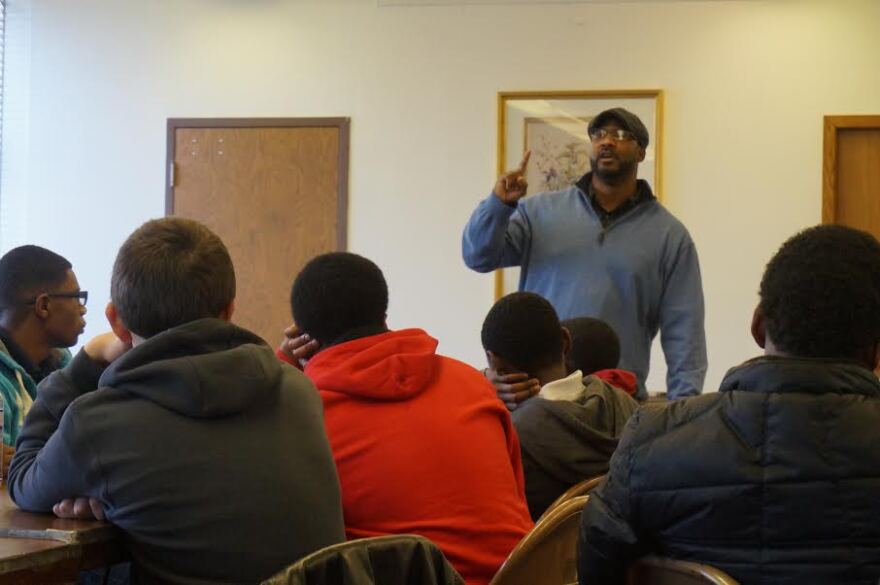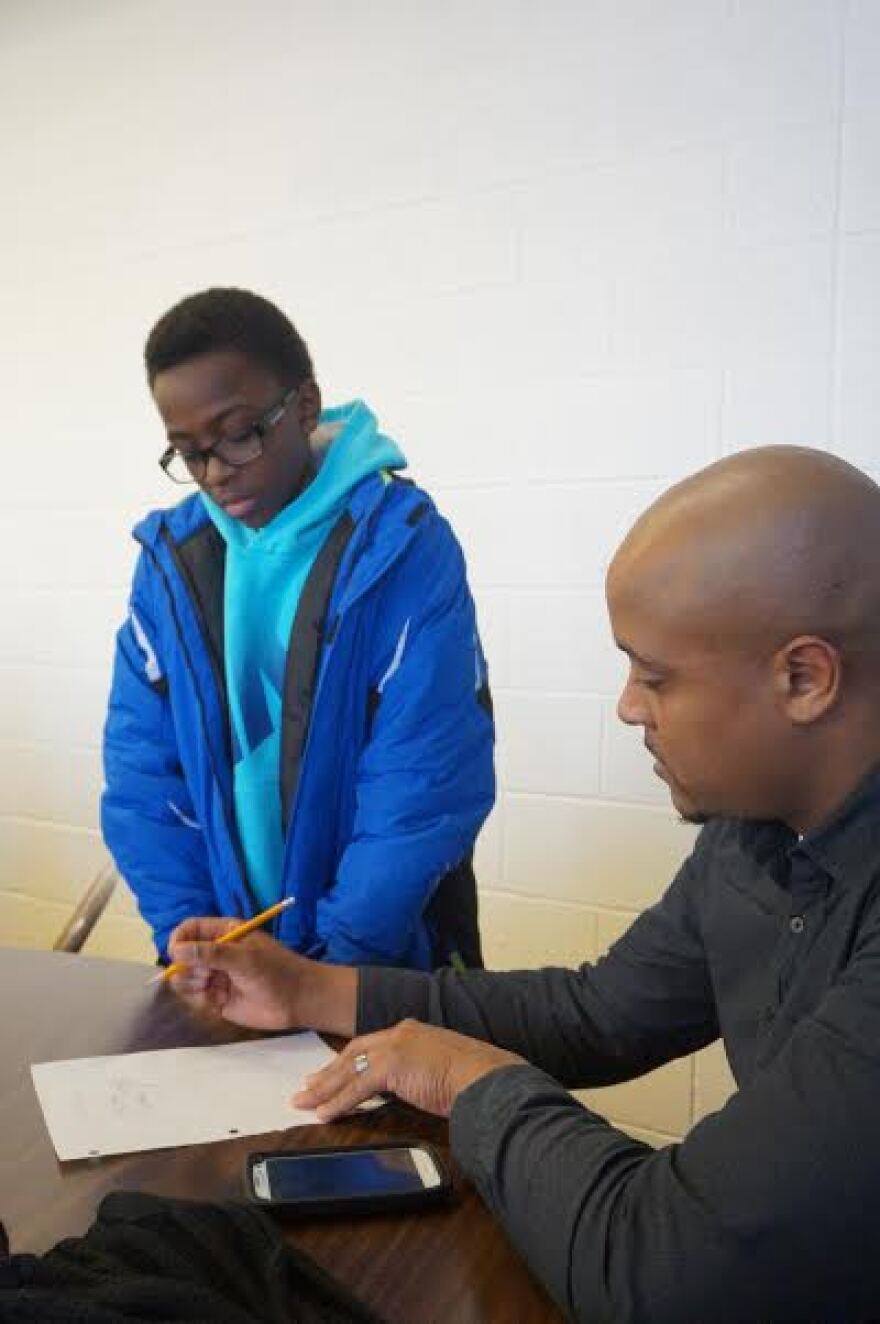All this week—and throughout 2014—WBOI is digging deeper into the reasons behind the achievement gap between black males and their peers in Fort Wayne and meeting the people working to make a change. We're calling the project "The Difference."
In Indiana, just 49 percent of black males graduate high school compared to 80 percent of their white peers. That number is improving, but it's still the seventh widest graduation gap in the country.
From social to systemic issues, there are many causes for the gap. But in Fort Wayne, a group of men and boys are trying to prove that mentorship can be a powerful agent of change.
In a spare church room on Indiana Avenue in Fort Wayne, a group of about fifty young men stand one at a time for roll call. This is My Brother's Keeper -- or MBK -- a peer-mentoring and leadership development group.
Each weekly meeting has a real world theme. This week: baggage. Virgil Tharp, the group's founder stands at the front of the room and poses questions to the group. What does it mean to have baggage? How does it hold you back?
Tharp shares some very personal stories of loss, and failure, and tells the boys they aren't going to make some of his same mistakes.
"We've got to change our hearts and transform our minds," Tharp says. "And we're going to do this now, not when you're thirty."
He says it's crucial to be transparent about adult issues, since so many of the boys already have to deal with them.
A whole series of studies suggest many young black men face a unique set of challenges growing up. Some are social, like cultural misunderstandings and racial stereotypes. Many are economic, like single parent homes and substance abuse. All are factors that can lead to academic underachievement.
Tharp says he can relate – he’s had first hand experience.
“I still have daddy issues," Tharp says. "I had a daddy but he was an alcoholic. I modeled what he did.”
He says he straightened up in part because of strong male figures and mentors in his life. But when he first started paying that forward and working with troubled youth, grades didn't go up, and behaviors didn't change.
“I initially thought 'hey if I come they're gonna change, because I'm showing support,'" Tharp says. "No. They needed more than just somebody coming in and out of their lives , because a lot of young men, that's what they're used to older men doing.”

My Brother's Keeper emphasizes peer-mentoring, a strategy passed on to Tharp from his own childhood mentor, another leader of MBK. They believe young people want to be great. Although the men set a good example, boys need to see boys who are just like them achieving.
Tharp gives an example.
"He's doing awesome in school, on the football team, made all state," he says. "I can be just like him, as a matter of fact I can call and talk to him.”
MBK sets standards and expects the kids to rise to them. They're required to earn A's and B's, do 30 hours of community service, mentor somebody else, and uphold a strict moral code.
“I've done so much stupid stuff, they can't get away with nothing," Tharp says.
It seems to be working – Tharp says his boys' grades are improving and their academic referrals have dramatically decreased.
One peer leader at MBK is 15-year-old freshman Diontre Collins-Jones. He facilitates group breakout discussions to help others work out issues they're experiencing at school and home.
Diontre wasn't always so determined – back in middle school, he says he often had a bad attitude with teachers. “Wasn't always the smartest move," Diontre says. But there were external challenges too.
"There was some gang play, some weed, drugs. So I was basically by myself self governing myself, and my government was terrible,” he says.
Diontre doesn't blame his father for his own misbehavior – but does say it hurt not having his dad around.
“I was sad and angry for a long time. A long, long time," Diontre says. "Then I came to the realization: being angry and mad at world ain't going to bring him back or going to make up for that lost time. But at a young age, I realized I'm the man of the house now. I've got to do what I've got to do.”
Diontre was lucky to have lots of support at home, but says MBK is what really got him to straighten up.
“Tharp pulled me off to the side. 'Hey, Tre, this is what you want to do, I'm going to show you how to do it.' I thought he was crazy," Diontre says. "I said I wanted to make good grades and be big in football. But I never had anyone to show me how to do it. I never had anyone to support me doing it. ”
Diontre lives at with his mom and three younger siblings. A few years ago, they moved to a safer part of Fort Wayne.
“At first we moved, and I had to leave behind a lot of my friends on the other side of town, but then I realized it was for the better," Diontre says.
His mother, L'Nee Collins-Jones, says in the old neighborhood there were lots of drug busts and domestic disputes - she was going back to school at the time.
“I told myself then -- when I was sitting there writing up my term paper -- that as soon as I got my degree we were going to get out of here," L'Nee Collins-Jones says. "I had to give my kids a fighting chance."
She is supportive, tries to go to all of Diontre's games, but is glad Tharp and MBK are there for her son, giving him positive men to model himself after.
She says she wants what a lot of parents want for their kids - a college education.
"I just want him to be successful, that's all I really want is for him: to be a productive citizen," Collins-Jones says.

That focus on education is a cornerstone of MBK, as well. Tharp requires all the boys to be on a path to college. He says higher education can lift a whole community.
“We have a lot of young men who are changing the outsets of their families,” Tharp says.
Tharp is trying to create a chain reaction – he supports the boys, who then support each other.
"Now we have greater and better fathers, better brothers, better husbands,” Tharp says.
But he knows that change happens one boy at a time.
This is the fourth story in our week-long kickoff of "The Difference."
You can help inform our coverage of black male achievement in Fort Wayne. Submit photos, stories, or news tips to valvino@nipr.fm.
And for personal stories, graphs, and more, check out our tumblr page: thedifferencefw.tumblr.com





